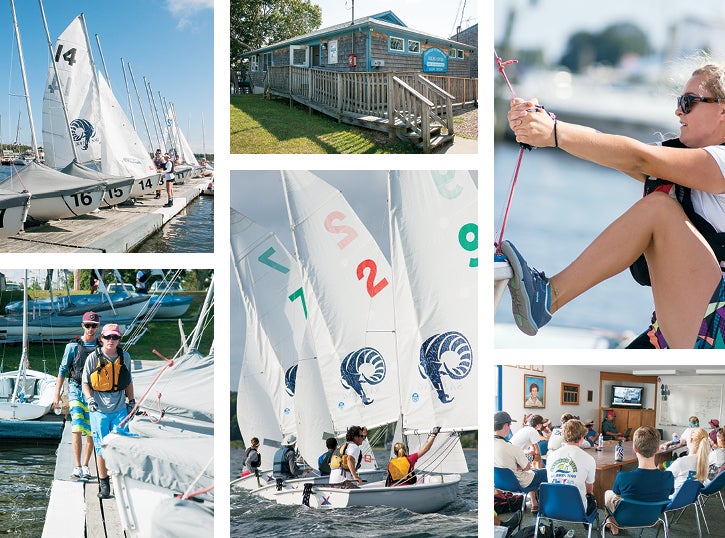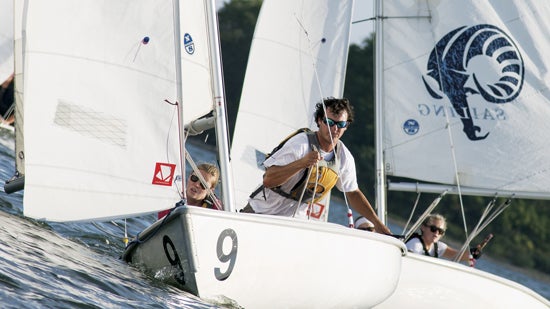The Wildest, Wettest Sport

It’s March, and your thoughts are naturally turning to summer, to the beach, maybe even to getting out on the water once it finally gets nice enough. Consider: URI’s sailing team, perhaps at this very moment, is already out there—whether March came in like a lamb, or like a lion.
Sailing has a storied 75-year history at URI. The Rams were national champions in 1965 and ’77, and continued to be challengers throughout the ’80s and ’90s, even as other schools were expanding their coaching, facilities, and funding. These days, the squad is playing catch up; it’s been a while since the coed team placed in the top ten nationally, although the women’s team won the nationals in 2011.
“Good dancers make good sailors. The music is the wind and the water, with their variations in tempo that change all the time.”
Rollin “Skip” Whyte ’72, a collegiate All-American, caught some of the fun when, as team captain in 1971, the team came third nationally. “Ok, we weren’t coed back then,” he says. “The Northeast was the last hold-out on that front, which sucked. But we did great, and we were just a small team from a tiny state university, against all the Ivies.”
Whyte brokered his college sailing success into two Olympic efforts and a 40-year coaching career. He led Boston University, a team on the verge of being dropped, to a first place at the nationals four years after taking the helm; then went on to become an Olympic coach, spanning five Olympiads and yielding five medal performances, including gold in 2004.
And in September 2013, the Wickford, R.I., native came home to URI. As sailing’s new head coach—which means he’s its only coach—there’s plenty of work ahead.
“I want to see if I can bring it back,” he says. “We are a young team right now and a lot will rest on recruiting, and that’s a two-year thing until they even get here. Bear in mind that sailing is a one-division sport, with club teams like us and big Division 1 NCAA teams like Stanford all thrown in together. No schools are allowed to give scholarships, which levels the field for us a bit. But basically, we are an underfunded program duking it out with the big guys.”
He seems to like it that way. At the Arrigan Sailing Pavilion down on Salt Pond, where the team has had its home for 23 years—and which it shares with recreational sailing, including lessons and a 2-credit kinesiology class that feeds the team a fair percentage of its walk-ons—his office is a revolving door of fit-looking students, curious recruits, and alumni who are thrilled he’s reinvigorating the program. The walls are lined with more than 30 All-American plaques; the team has also produced several Olympians and world champions. The team’s new website (urisailing.org) displays photos that show the raw drama of what the team does.
The Northeast, with its density of programs and short drive-times to water, is the de facto worldwide center of intercollegiate sailing, the arena any self-respecting sailor wants to play in. And it’s an increasingly coed arena—the 18 Vanguard Flying Juniors that many collegiate teams use handle better with a lighter crew, so in recent decades in particular, the sport has welcomed women.
Which brings Whyte to one of his biggest pitches: “Sailing is very social. It’s coed, it fosters responsibility and decision making, and you can enjoy it in many ways after college. I’d challenge any other sport to offer that combination of lifelong skills and opportunities.”
When it comes to winning, Whyte says you need commitment, intelligence, and talent. You can teach someone to be a decent crew-member, but to be a skipper, in charge of the boat—that’s different. “There’s always a bit of a mystery in the final equation,” he says. “I’ve noticed that good dancers make good sailors. The music is the wind and the water, with their variations in tempo that change all the time. Like good dancers, good sailors can’t always explain what they’re doing. It just flows.”
But time management and the ability to make decisions on the fly are critical skills that improve with practice—and good cardio fitness is essential, particularly if a boat capsizes amongst the ice floes that can plague early spring events. With no dedicated training facilities, Whyte keeps an online, shared spreadsheet in which team members note their 2,000-meter ergometer times each week, fostering a useful brand of friendly rivalry.
“Sailing is a two-season sport with up to five events a weekend, so we spend a lot of time together,” Whyte notes. “And since there’s only one of me and I can’t be everywhere at once, the squads have to operate independently—and they’ve really stepped up. What’s kind of nice is that no one on our team right now was a highly sought-after prospect in high school. They’ve come here and come a long way. They’ve moved past many of those top prospects, and we’re going to move past some more.”
The team had its best combined performances in many years at the Atlantic Coast Championships in November, the premier fall event, placing 13th for coed and 10th for women. Now, it has its eyes on nationals in May and June, which will be held in Newport—upping the ante for URI and its main in-state competition, Brown, Salve Regina, and Roger Williams.
“I’m never satisfied,” Whyte says, “but we’re getting better.”
Team members say he’s an intense coach. “When Skip came in the beginning of my junior year, the team was kind of in shambles,” says Caleb Armstrong ’16, an engineering major and the team’s top skipper. “He meant business right away. He’s not like any coach I’ve ever had—very serious about the sport, but also a complete character who will often make the entire team laugh during chalk talks.”
Elizabeth Durgin ’16, Caleb’s crew and a biology major, sailed out of Newport with her family throughout her childhood, and says she can’t wait to compete there at the nationals. “The women’s team has made it to nationals the past couple of years and if we stay on track, the coed team will too. I know we have what it takes.”
Durgin says Whyte’s coaching has helped her see her old hobby in a new way. “Skip has not only taught us new skills on the water, but taught us how to be athletes, including being disciplined and having the right mindset. He’s stressed the importance of acting as a team and each setting an example for the others.”
Whyte says this is the side of coaching he enjoys the most. “You’re with people for four years at kind of an important time in their lives, and you become central to their development,” he says. “I dig it.”
—Pippa Jack

 Home
Home Browse
Browse Close
Close Events
Events Maps
Maps Email
Email Brightspace
Brightspace eCampus
eCampus


